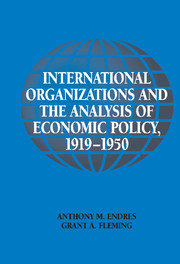Book contents
- Frontmatter
- Contents
- List of Figures and Tables
- List of Abbreviations
- Preface
- 1 Economics and Policy in International Organizations: Introduction
- 2 Business Cycles: Conceptions, Causes, and Implications
- 3 The Role and Conduct of Monetary Policy in the 1920s and 1930s
- 4 Public Investment Programs in the Interwar Period: Pre-Keynesian, Proto-Keynesian, and Keynesian Perspectives
- 5 Trade Policy Research: Geneva Doctrine and the Scandinavian Connection
- 6 Social Economics at the ILO: Scope, Content, and Significance
- 7 International Finance and Exchange Rate Policy
- 8 The Full Employment Movement from the 1940s
- 9 Conclusion
- References
- Index
1 - Economics and Policy in International Organizations: Introduction
Published online by Cambridge University Press: 29 July 2009
- Frontmatter
- Contents
- List of Figures and Tables
- List of Abbreviations
- Preface
- 1 Economics and Policy in International Organizations: Introduction
- 2 Business Cycles: Conceptions, Causes, and Implications
- 3 The Role and Conduct of Monetary Policy in the 1920s and 1930s
- 4 Public Investment Programs in the Interwar Period: Pre-Keynesian, Proto-Keynesian, and Keynesian Perspectives
- 5 Trade Policy Research: Geneva Doctrine and the Scandinavian Connection
- 6 Social Economics at the ILO: Scope, Content, and Significance
- 7 International Finance and Exchange Rate Policy
- 8 The Full Employment Movement from the 1940s
- 9 Conclusion
- References
- Index
Summary
PROLOGUE: A PERSPECTIVE ON THE LITERATURE
In the early twentieth century, John A. Hobson's Toward International Government (1915) reflected hopefully on the prospects for realizing the ideal of a “world community” or of “a society of nations” through the creation of an international organization. That organization would subordinate national advantage to the idea of international cooperation – an idea that Hobson did not fully articulate. Hobson could not have foreseen the evolution of international organizations committed to economic and social cooperation among nations over the twentieth century and the increasingly active role in international affairs that such organizations were to play from the creation of the League of Nations (LON) in 1919 onward.
There are now available a plethora of institutional and organizational histories expatiating on the functions and influences of international organizations in the twentieth century. Some recent studies have proceeded beyond recounting the history of administrative structures and functions to analyzing the nature, scope, and history of international economic cooperation – treating cooperation in connection with a flow of episodes, events, economic crises, and policy responses. An abundant literature written by economists has focussed attention on:
the macroeconomic stabilization, financial reconstruction, and enforcement programs of the LON and Bank for International Settlements (BIS) prior to 1939 (Pauly 1996; Santaella 1993; Schloss 1958);
the structure, function, and performance of international economic and financial institutions such as the International Monetary Fund (IMF) and World Bank (Black 1987; Gavin and Rodrik 1995; Krueger 1998; and MacBean and Snowden 1981); and
[…]
- Type
- Chapter
- Information
- Publisher: Cambridge University PressPrint publication year: 2002



